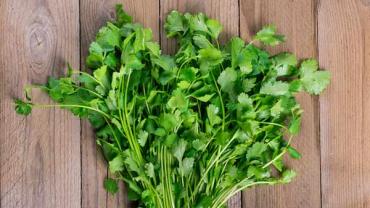
Cilantro, also known as coriander and Chinese parsley in other regions around the world, is an annual herb in the Apiaceae family, and elicits strong opinions; people either love the taste or hate it. Regardless, it is believed that human beings have been consuming this potent plant medicine for nearly 8,000 years and is thought to have been cultivated by ancient Egyptians before being introduced to the Americas in the 1600s.
In a study published earlier this year in FASEB Journal, scientists finally discovered the underlying anticonvulsant mechanism of action within cilantro leaf (Coriandrum sativum) that has been used for millennia as a common folk medicine to suppress seizure activity in epilepsy and other diseases. Researchers have found that cilantro, the ubiquitous culinary herb, is a powerful voltage-gated potassium channel subfamily Q (KCNQ) activator, in other words, cilantro activates a specific “class of potassium channels in the brain that reduces seizure activity”, and also imparts other therapeutic actions as well. Individuals with a KCNQ dysfunction are often resistant to modern anticonvulsant drugs which can cause severe epileptic encephalopathies.
Their findings identified one specific component of cilantro (the long-chain fatty aldehyde (E)-2-dodecenal) which binds to a specific area on the potassium channel causing them to open, reducing the excitability of cells. In the study, the (E)-2-dodecenal metabolite activated multiple KCNQ channels including the predominant cardiac and neuronal isoforms that are the primary regulators responsible for electrical activity in the heart and brain, and similar to the cilantro leaf itself, this metabolite delayed certain chemically-induced seizures.
Not only does cilantro have potential antiepileptic properties, but it has been shown in research to encourage the removal of heavy metals from the body, and to inhibit heavy metal absorption into bone and soft tissue. According to the principal researcher in the study, “cilantro has also reported anti-cancer, anti-inflammatory, anti-fungal, antibacterial, cardioprotective, gastric health and analgesic effects”.
The most commonly used and prescribed anticonvulsant medications are known to cause depletion of the following nutrients: vitamin B12, folate (vitamin B9), vitamin B6, biotin (vitamin B7), calcium, vitamin D, omega-3 fatty acids, carnitine, glutathione, vitamin K, and thiamine (vitamin B1). Possible symptoms associated with deficiencies of these nutrients include:
The discovery of the underlying mechanism behind cilantro’s anticonvulsant properties is exciting news and very important as it may lead to modifications of dodecenal in order to develop more effective and safer anticonvulsant drugs and reducing overall drug-induced nutrient depletions. Along with incorporating more herbs and spices into the diet, and ensuring patients are eating a broad spectrum of vegetables, low-glycemic fruits, and high-quality proteins, supplementing with high-quality, bioavailable vitamins, minerals, fish oil, and antioxidants like liposomal glutathione, is critical for optimizing patients overall health and reducing the risk of any one of these medication-induced deficiencies.